

Democratic Ideology in Islamist Opposition? The Muslim Brotherhood's ‘Civil State’ - Middle Eastern Studies - Volume 45, Issue 2. Over the last two decades, the political ideology of the Egyptian Muslim Brotherhood has evolved to proactively advocate a democratic form of government.
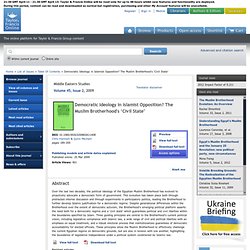
This evolution has taken place both through protracted internal discussion and through experiments in participatory politics, leading the Brotherhood to further develop Islamic justification for a democratic regime. Despite generational differences within the Brotherhood over the extent of democratic activism, the Brotherhood's emerging political platform asserts the need both for a democratic regime and a ‘civil state’ which guarantees political and civil liberties within the boundaries specified by Islam. Related articles View all related articles. Mobilizing Islam. Carrie Rosefsky Wickham Paper, 300 pages, ISBN: 978-0-231-12573-4 $32.00 / £22.00 October, 2002 Cloth, 300 pages, ISBN: 978-0-231-12572-7 $95.00 / £65.50 Mobilizing Islam explores how and why Islamic groups succeeded in galvanizing educated youth into politics under the shadow of Egypt's authoritarian state, offering important and surprising answers to a series of pressing questions.
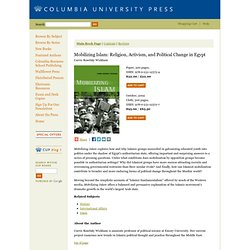
Under what conditions does mobilization by opposition groups become possible in authoritarian settings? Why did Islamist groups have more success attracting recruits and overcoming governmental restraints than their secular rivals? In Atlanta, Georgia at the Political Science Department, Emory University. Reading Reform into the Past: Power and Piety in Islamist Articulations of Muslim History. The Society of the Muslim Brothers. Muslim Extremism in Egypt : Gilles Kepel. Professor Gilles Kepel - Individual Bios - People - IDEAS.
Sayyid Qutb and the Origins of Radical Islamism. Sayyid Qutb (1906-1966) was an influential Egyptian ideologue credited with establishing the theoretical basis for radical Islamism in the post colonial Sunni Muslim world.
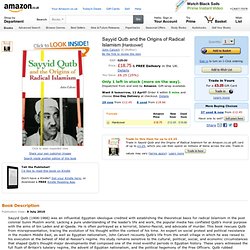
Lacking a pure understanding of the leader's life and work, the popular media has conflated Qutb's moral purpose with the aims of bin Laden and al-Qaeda. He is often portrayed as a terrorist, Islamo-Fascist, and advocate of murder. This book rescues Qutb from misrepresentation, tracing the evolution of his thought within the context of his time. An expert on social protest and political resistance in the modern Middle East, as well as Egyptian nationalism, John Calvert recounts Qutb's life from the small village in which he was raised to his execution at the behest of Abd al-Nasser's regime. His study remains sensitive to the cultural, political, social, and economic circumstances that shaped Qutb's thought-major developments that composed one of the most eventful periods in Egyptian history.
John Calvert on Sayyid Qutb. On Rorotoko, John Calvert. author of Sayyid Qutb and the Origins of Radical Islamism, offers a fascinating discussion of the subject of his book and his ambitions in writing the book.
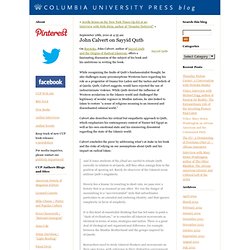
While recognizing the faults of Qutb’s fundamentalist thought, he also challenges many preconceptions Westerns have regarding his role as a progenitor of Osama bin Laden and the tactics and beliefs of al Qaeda. Qutb, Calvert suggests, would have rejected the use of indiscriminate violence. While Qutb decried the influence of Western secularism in the Islamic world and challenged the legitimacy of secular regimes in Muslim nations, he also looked to Islam to restore “a sense of religious meaning to an immoral and disenchanted colonial world.” Sayyid Qutb, man of his era. During the Second World War, Sayyid Qutb commuted to his government job in central Cairo on a train that ran north from his home in the suburb of Helwan.
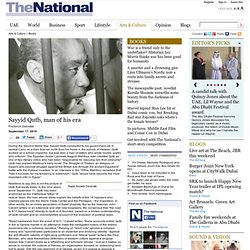
Qutb worked as a school inspector, but was also a man of letters who wrote novels, poetry and criticism. The Egyptian Nobel Laureate Naguib Mahfouz later credited Qutb as one of two literary critics who had been "responsible for rescuing him from obscurity": Qutb had praised Mahfouz's early novel The Struggle of Thebes, an allegory of Egypt's anti-colonial struggle against the British told through the ancient Egyptians' battle with the Hyksos invaders.
In an interview in the 1990s, Mahfouz remarked that "had it not been for his tendency to extremism," Qutb "would have become the most important critic in Egypt. " Needless to say, this is not the picture of Qutb that exists today. Page 2 of 2 Qutb spent nearly a decade in Tura prison. Despite his discontents with America, Qutb would probably have been disturbed by September 11. John Calvert On his book Sayyid Qutb and the Origins of Radical Islamism : Cutting-Edge Intellectual Interviews.